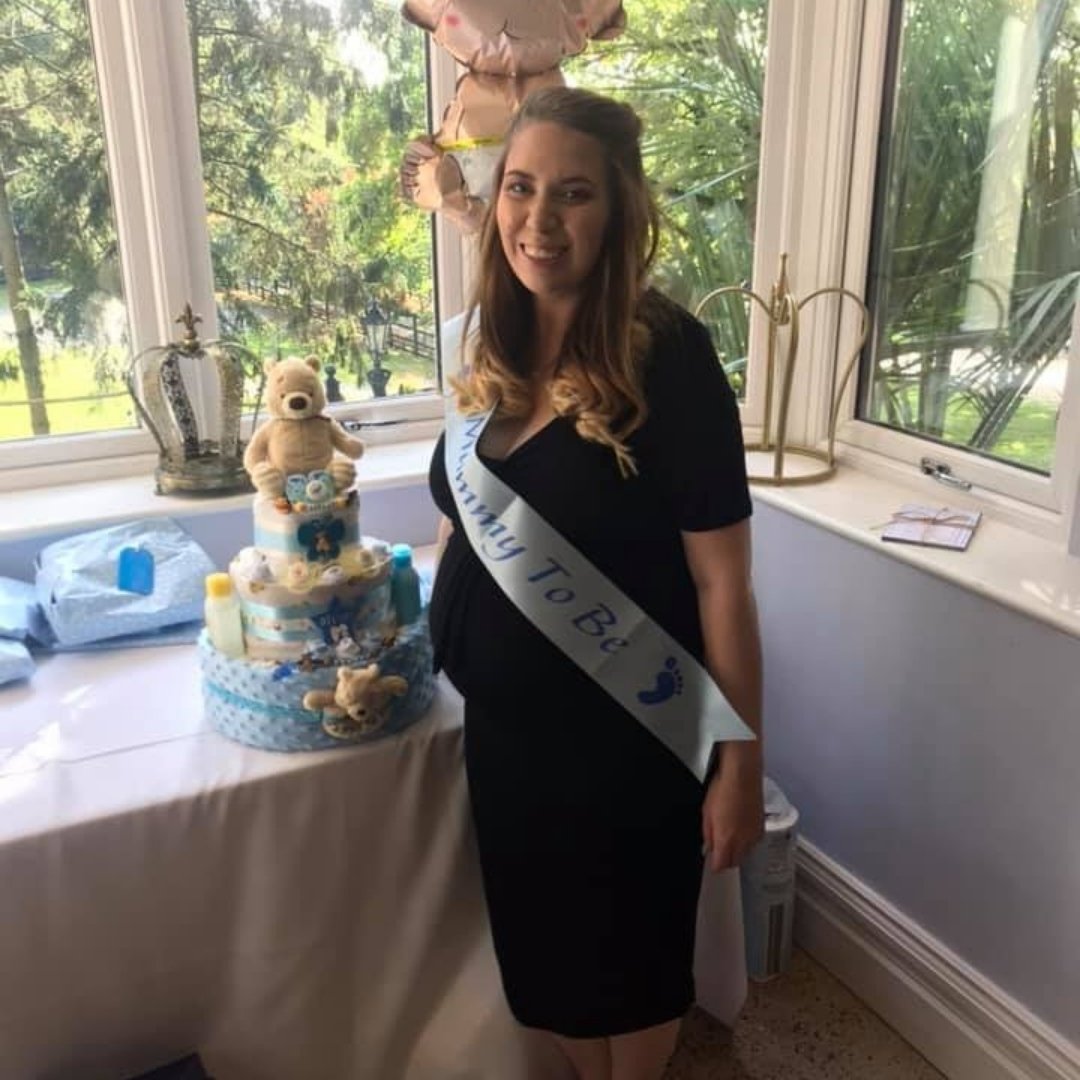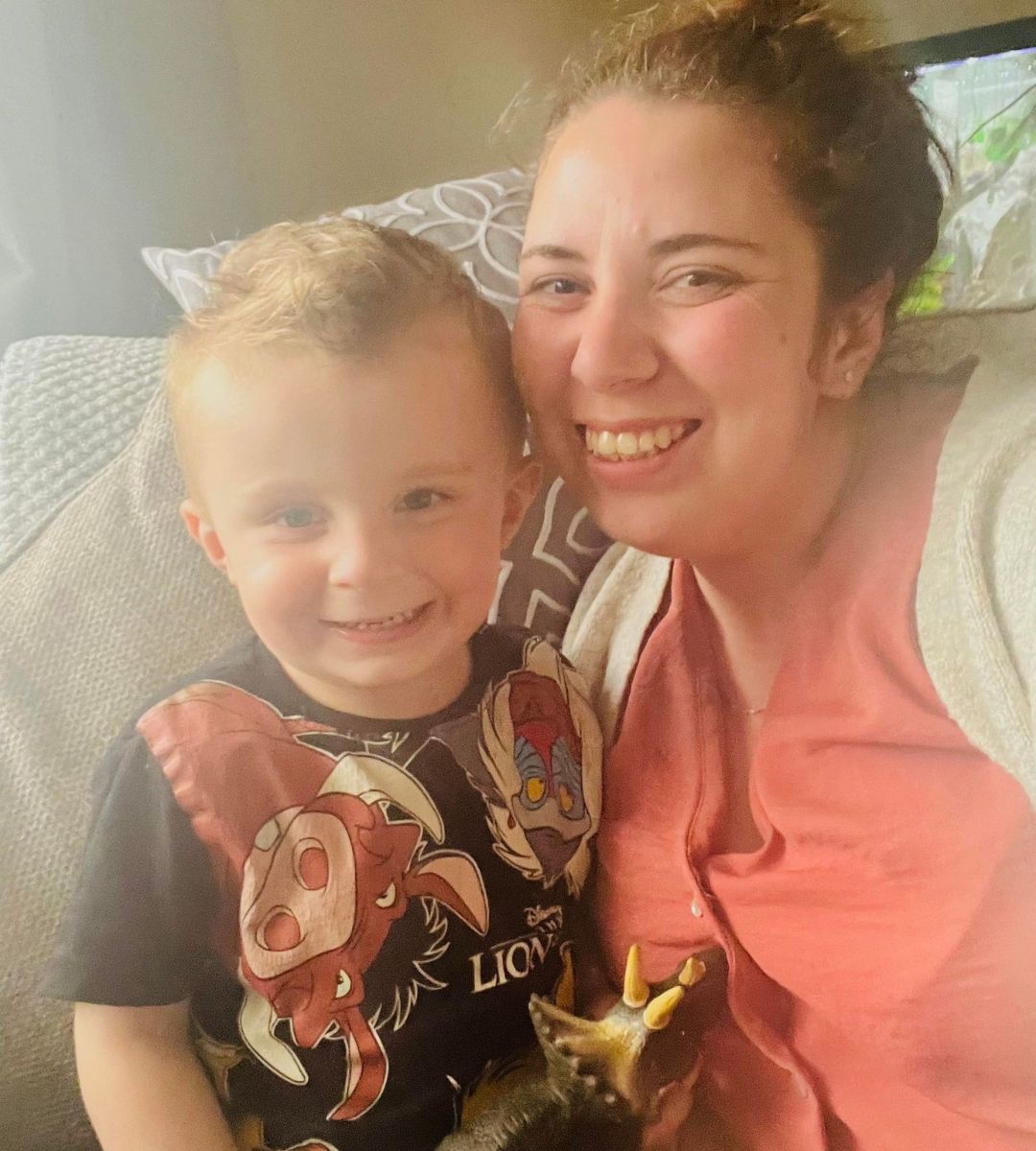Paige was diagnosed with peripartum cardiomyopathy (PPCM) after giving birth to her baby boy, Ollie. Paige has shared her cardiomyopathy journey with us in the hope it will help other mums and families going through a similar experience.
The signs and symptoms
During the latter part of my pregnancy, I was experiencing high blood pressure. The doctor did further investigation, but my blood pressure settled down again, so no more action was taken. I would often get out of breath quickly, and go dizzy when doing simple tasks like walking up the stairs etc. I also had swelling around my feet. At the time I thought these were just pregnancy-related symptoms.
After giving birth, I felt perfectly fine for the first few days. On about day four post-birth, I took a dramatic turn, I started uncontrollably sobbing in bed, shaking, and felt unwell. It felt like I was having a panic attack, but I was struggling to breathe.

I also got diagnosed with sepsis on the night of arrival at A&E. This meant they pumped me with fluids to treat the blood infection, however, due to my heart going into failure (which the doctors weren’t aware of at the time) this caused my lungs to fill up with the fluid. I was admitted from A&E to the Perinatal Ward, as I had not long had Ollie and the doctors were worried that I could’ve had a bit of placenta left inside my womb, which would’ve caused the sepsis.
The diagnosis
After becoming even more unwell, I was taken down to the Labor Ward so I could receive more one-to-one care. I was taken for a chest x-ray which showed my lungs were full. This led them to believe that I possibly had pneumonia, so I was taken up to CCU (Critical Care Unit). Once in the CCU after having multiple chest X-rays, internal scans, CT scans and scans of my heart, I was diagnosed with peripartum cardiomyopathy (PPCM) on the 29th of November.
I was heartbroken (mentally and physically). I didn’t want my little boy to come and visit me (he was only a few days old) as I didn’t want him in the hospital. I thought he could get ill and would be safer with family and friends. I was beyond distraught thinking that I wouldn’t get to hold my baby ever again or see him grow up. I was in complete disbelief that a few days ago I was looking great, taking being a mummy in my stride, to my husband and mum being called to say goodbye to me at the hospital.
I felt really vulnerable, especially during the main scans that were done in my private CCU. I didn’t have anyone there but doctors, nurses, and students. I was terrified that I was nearly dying from heart failure, yet I just felt like I was a bit of a guinea pig due to my condition being ‘rare’. It felt so overwhelming with everyone in the room during this intense and emotional time, and not having any of my loved ones there with me was so difficult.
The impact of my diagnosis
Before my experience, I always thought heart problems were more age-related. I have no family history of heart problems, so I honestly never thought that I would be diagnosed with a heart condition when I was just 22 years old. The fact that it was a type of pregnancy-related heart failure affected me massively, both physically and mentally as I had never even heard of the condition until I was diagnosed. I have learnt that anyone can have a heart condition – it’s not specific to your age, diet, or lifestyle.
Emotionally I have suffered a lot. I was diagnosed with post-traumatic stress disorder (PTSD), anxiety and depression which would get triggered by noises, smells, and certain words. This took me into a dark and lonely place. At one point I felt like I didn’t want to be alive anymore, but luckily, despite COVID restrictions, I had great support around me from my amazing friends, family, and professionals.
The Peri-Natal team that supported me honestly were my lifeline. They helped me to understand more about my condition and helped me interact with others with the same condition as me in the UK, so I didn’t feel as alone. I had regular meetings with them on a really informal level, I felt like they were family.

They helped me bond with my little boy, as I struggled coming out of the hospital. I felt that he wouldn’t remember me or know who I am because I hadn’t seen him for a week at the start of his little life. I felt almost resentful to my amazing family who helped to look after him whilst I was admitted to the hospital, and I was jealous that they got to spend that crucial time with him that I did not.
I still have so much guilt that the emotions I felt during this time impacted my little boy. I felt like a failure at the time, and it put a real barrier between me and my husband after I nearly died of heart failure. He struggled with the realization that he could’ve had to bring him up all on his own and he didn’t think he was good enough to be our little boy’s dad. It’s taken a while for this to rebuild, but now he is the best daddy in the world (he still doesn’t know it though).
Living with cardiomyopathy
I struggled with day-to-day things, I had regular chest pains and tightness up to a year after my diagnosis and body exhaustion. I would struggle a lot when I was coming down with any sort of illness, like colds, as my body just wasn’t as strong as it was before. However, I am now off all my medication for my heart, just some blood pressure tablets and dare I say it – I’m physically doing well.
Emotionally, I really struggled with the thought that because this was a pregnancy-related heart failure, this would mean I couldn’t have any more children, as this is what the doctors told me when first diagnosed. That broke me as I have always worked in childcare and always dreamt of having two or three children. However, now I am supported by an amazing team at UHCW (University Hospital of Coventry & Warwickshire). They have done additional ultrasounds on my heart, and confirmed it is back to full recovery. I have since learnt that under close supervision and monitoring under the team I can move forward with future pregnancies (obviously understanding the risks).
I feel very sympathetic towards others with cardiomyopathy, and I am certainly more aware of what cardiomyopathy is. I am using my experience now to be able to spread awareness and hopefully make pregnant women, their families, friends and more professionals aware to potentially see symptoms and ask, “Could it be PPCM?”. I hope that more awareness around the condition can save lives and potentially lead to earlier diagnosis, reducing the risks and impacts of the condition that I faced.
To share her story and continue raising awareness for peripartum cardiomyopathy, Paige started a Facebook group documenting her journey, sharing resources, and raising awareness of the symptoms. You can find Paige’s group below.